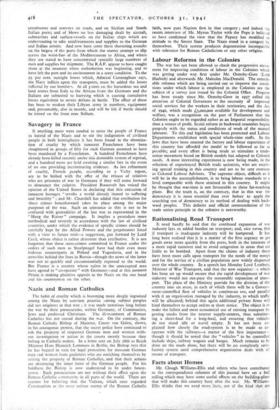Rationalising .Road Transport
.It need hardly be said that the continued expansion of war industry lays an added burden on transport; and, vice versa, that if transport is inadequate industry will be hampered. It has long been realised that it is a matter of the first urgency to get goods away more quickly from the ports, both in the interests of a more rapid turnover and to avoid congestion in areas that are liable to be bombed. Apart from the claims of industry there have been more calls upon transport for the needs of the troops and for the service of a civilian population now widely dispersed over the whole country. In a speech last Monday Lord Leathers, Minister of War Transport, said that the new organism' .7_ n which has been set up would ensure that the rapid development of war industry would not out-pace the reasonable expansion of trans- port. The plans of the Ministry provide for the division of the country into six areas, in each of which there will be a Govern- ment-controlled fleet of vehicles in continuous use, and parallel with it an organisation managed by the industry, to which traffic will be allocated; behind this again additional private firms will bind themselves to accept orders at short notice. The object is to make the fullest and most economical use of existing transport by getting stocks from the nearest supply-centres, thus substitut- ing a short-haul for a long-haul, and ensuring that vehicles do not stand idle or travel empty. It has not been eN- plained how closely the road-system is to be made to co- operate with the railways—a matter of the first importance-- though it should be noted that the " vehicles " to be controlled include ships, railway wagons and barges. Much remains to be done on the roads alone, but there will be no completely satis- factory system until comprehensive organisation deals with all means of transport.






















 Previous page
Previous page